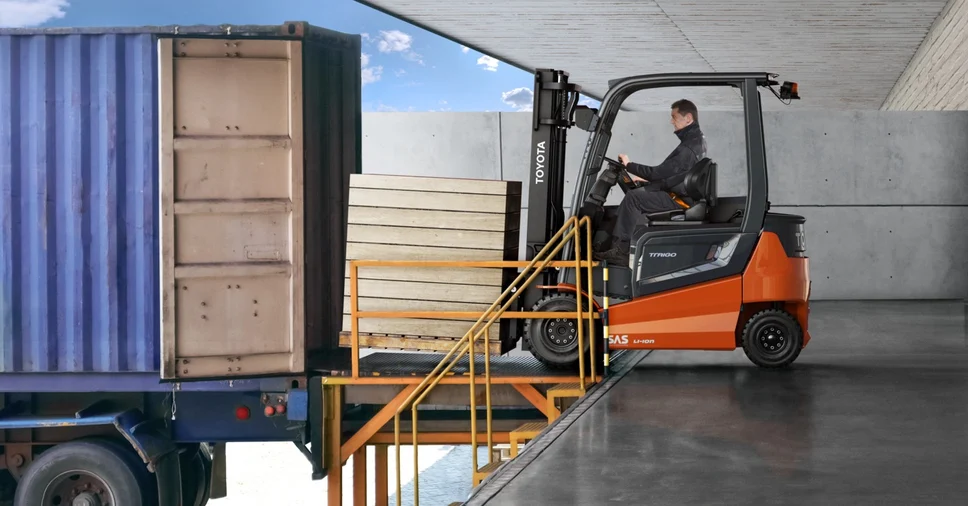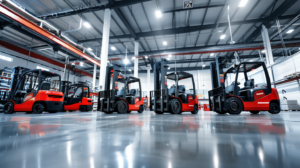Forklifts are essential machines in industries that require heavy lifting, moving, and storage operations. Whether in construction sites, warehouses, shipping docks, or factories, forklifts play a crucial role in improving productivity and efficiency. However, one common question that arises when selecting a forklift is, “Are there both gasoline and diesel forklifts?” The answer is yes, there are both gasoline and diesel forklifts, each offering distinct advantages depending on the nature of your operations.
In this article, we’ll explore the differences between gasoline and diesel forklifts, their benefits, applications, and what factors to consider when choosing between them. We will also introduce you to a reliable brand, Nicosail, for high-quality forklifts at the end of the discussion.

1. Introduction to Forklifts and Their Importance
Forklifts, also known as lift trucks, are powered industrial trucks designed to lift and move materials over short distances. The modern forklift, first introduced in the early 20th century, has become an indispensable tool in the logistics and material handling sectors. Forklifts can be powered by a variety of energy sources, including gasoline, diesel, electricity, propane, and natural gas. Each type of fuel source offers unique benefits, and the choice depends on the specific needs of the operation.
Choosing the right type of forklift can greatly impact the efficiency, cost-effectiveness, and environmental impact of your operations. Gasoline and diesel forklifts are the most common fuel types for outdoor and high-demand applications, but what sets them apart?
2. Gasoline Forklifts: Overview and Benefits
Gasoline-powered forklifts are known for their power, agility, and ability to handle heavy-duty tasks. These forklifts use traditional internal combustion engines (ICE), fueled by gasoline. They are ideal for applications where quick movements and high performance are necessary.
2.1 Key Benefits of Gasoline Forklifts
- High Speed: Gasoline forklifts typically offer faster acceleration and higher top speeds than other fuel types, which makes them ideal for applications requiring frequent movement over long distances.
- Great for Outdoor Use: These forklifts perform well outdoors, especially in environments that require continuous operation under varying weather conditions.
- Versatility: Gasoline forklifts can handle a wide range of weights and sizes, making them suitable for various industries, from manufacturing to warehousing.
- Lower Initial Cost: Gasoline-powered forklifts generally have a lower upfront cost compared to electric models, making them a cost-effective choice for businesses with tight capital budgets.
2.2 When to Use Gasoline Forklifts
Gasoline forklifts are most effective in outdoor environments or well-ventilated indoor settings due to the emissions they produce. They are perfect for industries where lifting, loading, and unloading heavy materials quickly is crucial, such as in the construction industry, logistics companies, and manufacturing plants.

3. Diesel Forklifts: Overview and Benefits
Diesel forklifts also rely on internal combustion engines but are fueled by diesel instead of gasoline. These machines are known for their torque and durability, making them ideal for heavy-duty applications, especially in harsh outdoor environments.
3.1 Key Benefits of Diesel Forklifts
- High Torque and Power: Diesel engines are known for producing high torque, which translates into better lifting power and more effective handling of heavy loads.
- Fuel Efficiency: Diesel forklifts are more fuel-efficient than their gasoline counterparts, making them a more economical choice for long-term use.
- Durability: Diesel engines tend to have longer lifespans and are more durable, especially in challenging environments such as construction sites.
- Performance in Rough Terrain: Diesel forklifts excel in tough, uneven terrains, making them a popular choice for outdoor settings like ports, timber yards, and mining sites.
3.2 When to Use Diesel Forklifts
Diesel forklifts are best suited for outdoor operations where their higher emissions won’t be an issue. They are perfect for industries that require handling extremely heavy loads or for environments where rough terrain is a challenge, such as in construction, agriculture, and mining.
4. Comparing Gasoline and Diesel Forklifts: Key Differences
While both gasoline and diesel forklifts offer power and performance, they differ in several ways that can affect your operational efficiency and costs. Let’s dive deeper into the key differences between the two:
4.1 Power and Performance
- Gasoline Forklifts: Offer faster acceleration and smoother handling, making them more suitable for applications where speed is critical.
- Diesel Forklifts: Provide superior torque, which makes them better suited for lifting heavy materials and operating in challenging conditions.
4.2 Fuel Efficiency
- Gasoline Forklifts: Consume more fuel compared to diesel forklifts, which can increase operational costs in the long run.
- Diesel Forklifts: Are more fuel-efficient, which can lead to cost savings, especially for businesses that use forklifts intensively over extended periods.
4.3 Durability
- Gasoline Forklifts: May require more frequent maintenance due to the wear and tear on the engine from high-speed operations.
- Diesel Forklifts: Known for their durability, diesel engines can withstand heavier use and are generally more robust over time.
4.4 Environmental Impact
- Gasoline Forklifts: Emit fewer particulates than diesel forklifts but still produce significant amounts of CO2 and other pollutants, making them less environmentally friendly.
- Diesel Forklifts: Emit more particulates and NOx, contributing to air pollution, which may restrict their use in certain indoor or regulated outdoor environments.
4.5 Noise and Vibration
- Gasoline Forklifts: Tend to operate more quietly and smoothly compared to diesel forklifts.
- Diesel Forklifts: Are louder and produce more vibrations due to the nature of diesel combustion, which may be an issue in noise-sensitive environments.

5. Considerations for Choosing Between Gasoline and Diesel Forklifts
When choosing between gasoline and diesel forklifts, it’s essential to consider several factors, including:
5.1 Operational Environment
If your operations are primarily outdoors or involve rough terrains, diesel forklifts may be the better option due to their superior torque and ability to handle uneven surfaces. For indoor or mixed-use environments, gasoline forklifts might be preferable, provided there is adequate ventilation.
5.2 Load and Application
For applications that involve frequent lifting of extremely heavy materials, diesel forklifts offer better torque and durability. If speed and maneuverability are more important, gasoline forklifts may be the better choice.
5.3 Frequency of Use
For businesses that use forklifts extensively, fuel efficiency and long-term operational costs are crucial factors. In such cases, diesel forklifts can offer significant savings due to their superior fuel efficiency and longer engine lifespans.
5.4 Initial Costs vs. Long-Term Savings
While gasoline forklifts tend to have a lower upfront cost, diesel forklifts may offer more value over time due to their fuel efficiency and durability. Businesses should weigh the initial investment against the potential long-term savings in fuel and maintenance costs.

6. Common Alternatives: LPG and Electric Forklifts
In addition to gasoline and diesel forklifts, there are also LPG (liquefied petroleum gas) and electric forklifts available, each offering distinct advantages:
- LPG Forklifts: These forklifts are powered by propane and are considered cleaner than both gasoline and diesel options. They offer a good balance of power and emissions and can be used indoors and outdoors.
- Electric Forklifts: Powered by rechargeable batteries, electric forklifts produce zero emissions and are quieter than gasoline or diesel models. They are ideal for indoor use and are becoming increasingly popular due to their environmental benefits.
7. Maintenance and Safety Considerations for Gasoline and Diesel Forklifts
Both gasoline and diesel forklifts require regular maintenance to ensure safety and performance. Some key maintenance and safety tips include:
- Regular Oil Changes: Ensure oil is changed regularly to keep the engine running smoothly.
- Inspect Fuel Systems: Check for leaks and wear in the fuel system to prevent dangerous malfunctions.
- Tire Maintenance: Since these forklifts are often used outdoors, ensure that tires are in good condition to avoid accidents.
- Emissions Testing: Both gasoline and diesel engines produce emissions, so it’s crucial to perform regular emissions testing to comply with environmental regulations.

8. Forklift Brands: Why Choose Nicosail for Your Forklift Needs?
When investing in a forklift, it’s essential to choose a reliable and reputable brand. Nicosail is a leading manufacturer of high-quality forklifts, offering both gasoline and diesel models tailored to meet the diverse needs of different industries. Here’s why Nicosail stands out:
- Wide Range of Forklift Options: Whether you need gasoline or diesel-powered forklifts, Nicosail offers a wide selection of models designed for various applications.
- Durability and Performance: Nicosail forklifts are known for their robust construction, ensuring long-term durability and performance even in the most demanding environments.
- Customer Support: Nicosail provides excellent customer support, including maintenance services and replacement parts, ensuring that your forklift continues to operate at its best.
- Affordability: Despite their superior quality, Nicosail forklifts are competitively priced, offering excellent value for businesses looking to maximize their investment.
If you’re in the market for a reliable and powerful forklift, Nicosail’s gasoline and diesel models are an excellent choice for your material handling needs.
Conclusion
Both gasoline and diesel forklifts are powerful machines designed to handle demanding industrial tasks. Gasoline forklifts are known for their speed and versatility, while diesel forklifts excel in fuel efficiency, torque, and durability. The choice between the two largely depends on your specific operational needs, including the environment, load requirements, and frequency of use.
For businesses seeking high-performance, long-lasting forklifts, Nicosail offers a range of gasoline and diesel models that can meet your material handling demands. With their commitment to quality and customer service, Nicosail ensures that your forklift investment is both reliable and cost-effective.





